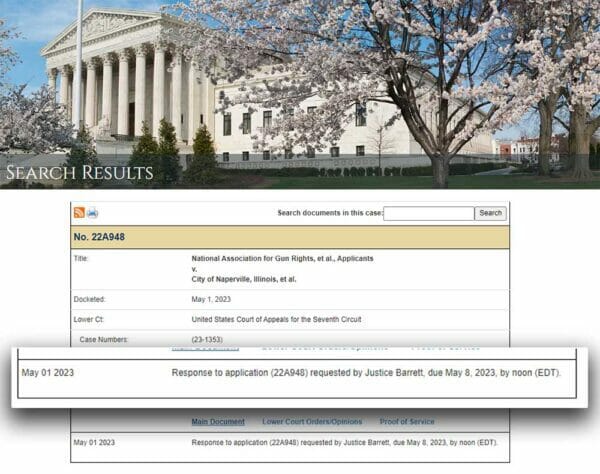The Supreme Court has taken an interest in a case challenging the city of Naperville, Illinois’ ban on the sale of AR-15s and similar firearms.
With Justice Amy Coney Barrett asking the city to respond to an emergency request for an injunction against the ordinance by May 8th, 2023, it is evident that the issue of so-called “assault weapons” bans is gaining attention at the highest level of the judiciary.
The National Association for Gun Rights (NAGR) and other pro-Second Amendment groups have long argued that such bans are unconstitutional. They cite last year’s Supreme Court decision in New York State Rifle and Pistol Association v. Bruen, which established a new test for gun cases, as evidence that the Naperville ban and similar ones across the country are legally unjustified.

The Bruen decision has already led to 31 successful claims against existing gun restrictions in various states. However, the Supreme Court has yet to take up another Second Amendment dispute since the ruling. The case against the Naperville ordinance could potentially change that and provide much-needed clarity on the constitutionality of so-called “assault weapons” bans.
Proponents of these bans argue that they are necessary to curb gun violence, while critics assert that they infringe upon Americans’ Second Amendment rights. The debate over gun control in America has largely centered around the AR-15 and similar firearms, which are among the most popular weapons in the country.
In Illinois, a statewide ban on such firearms was enacted earlier this year, only to be blocked in state and federal court.
A majority of Illinois sheriffs have also opposed the ban, refusing to enforce it on the grounds that they consider it unconstitutional.
The Naperville case could potentially signal a shift in the legal landscape surrounding gun control in America. If the Supreme Court does issue an injunction against the ordinance, it could have significant implications for similar bans in ten other states. However, it is important to note that most cases where briefs are requested do not receive a full hearing.
Despite this, NAGR remains confident that it will prevail in its case against the state of Illinois. Dudley Brown, the organization’s president, stated;
“Any ban on so-called ‘Assault Weapons’ is plainly unconstitutional, and now it is on the city of Naperville to explain the legal justification for their ban. Of course, there isn’t any. The bans were ludicrous from the start, and if Illinois had any sense, they would wave the white flag now and save us all some time”.
Justice Amy Coney Barrett and the Supreme Court’s request for a response from Naperville officials serves as a reminder that the debate over gun control in America remains contentious and unresolved. With pro-Second Amendment advocates continuing to fight against what they see as unconstitutional restrictions on their right to bear arms, the battle over the AR-15 and similar weapons is far from over.
Bevis v Naperville Appeal 2023
